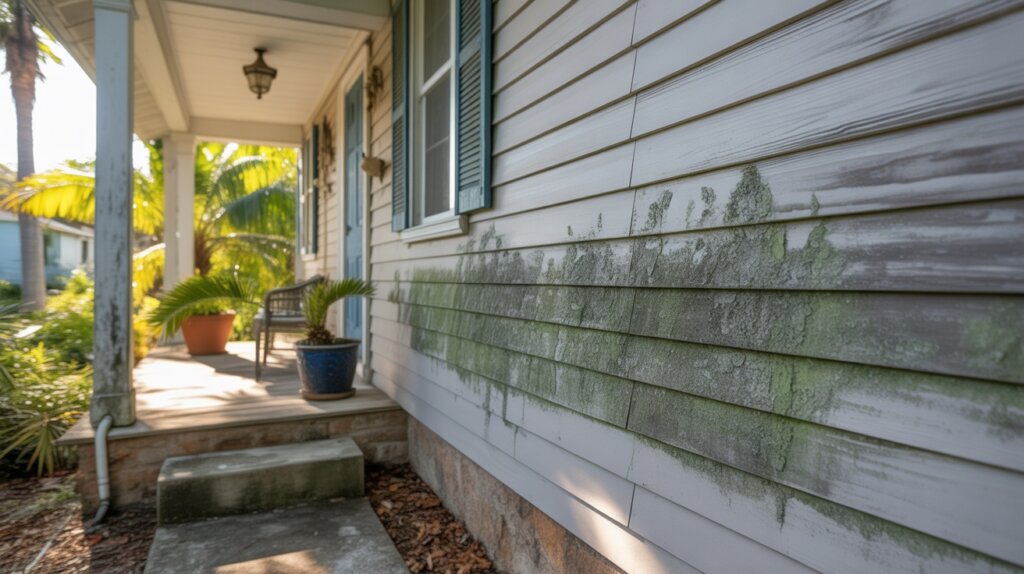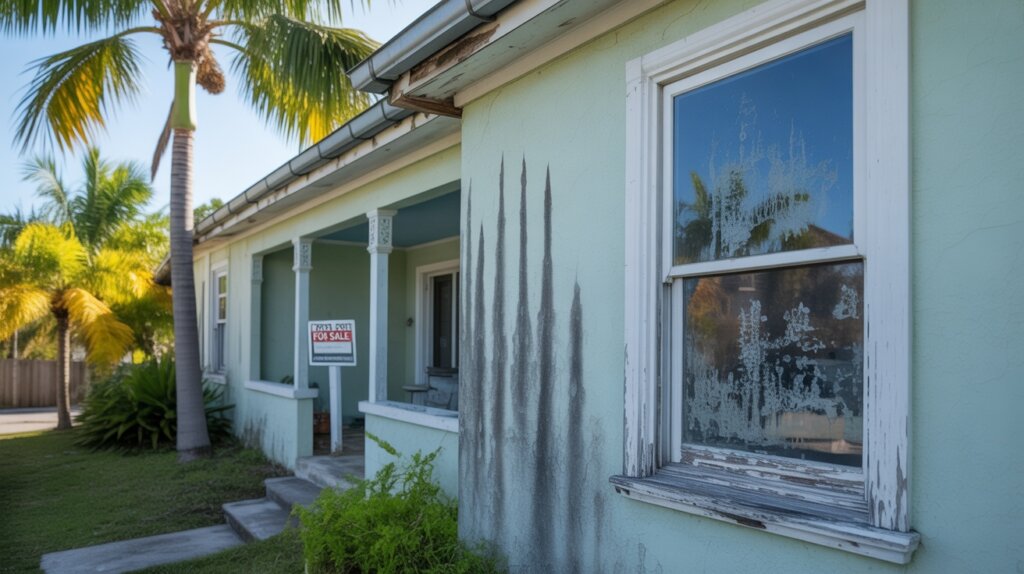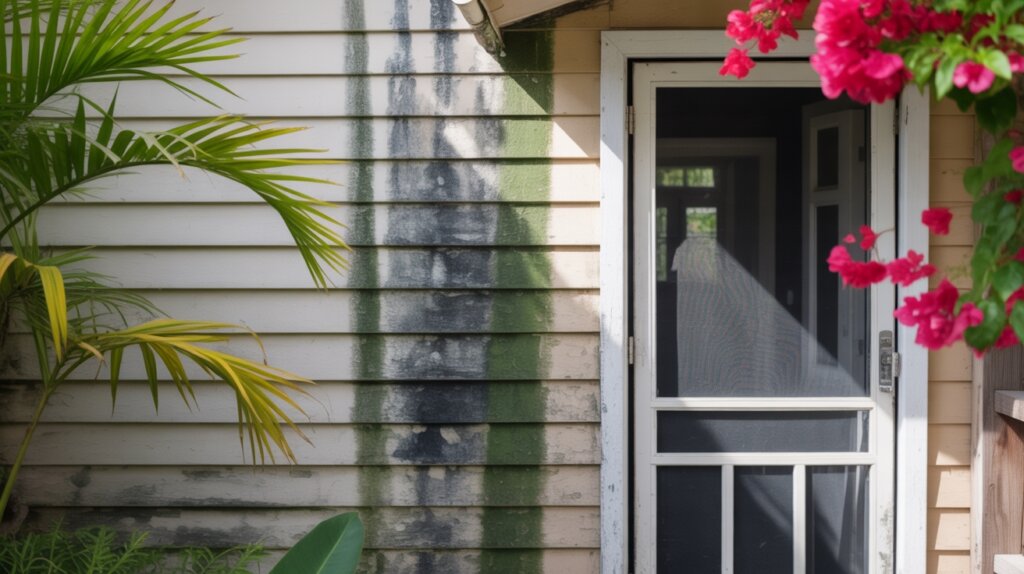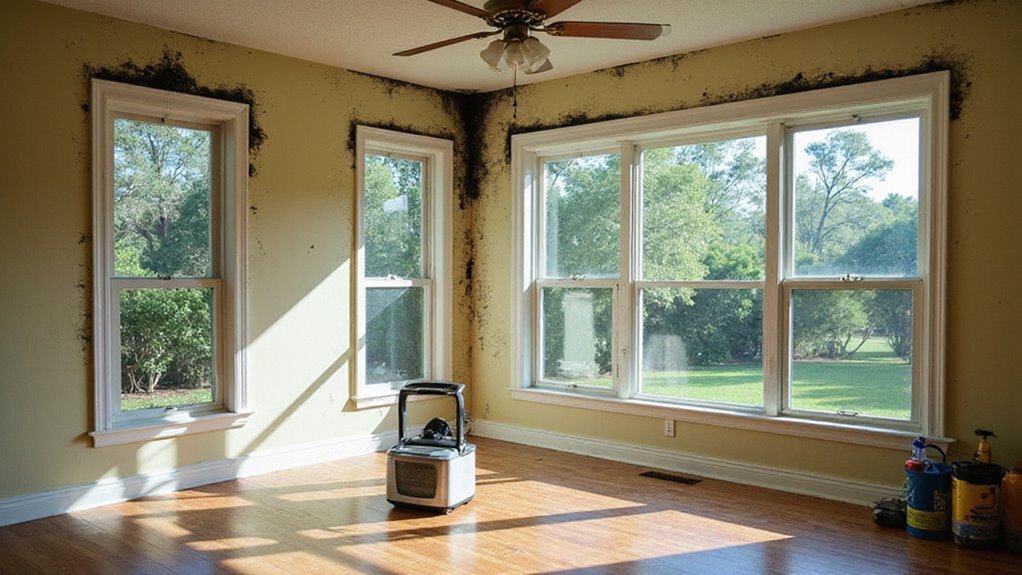Selling a house with mold issues in Florida can be stressful and overwhelming. Mold can lower your home’s value and scare away buyers. You need to know how to handle this problem before listing your property.
If you ignore the mold, you could face legal problems and lose potential buyers. Mold can spread quickly and cause health concerns for anyone living in the home. You might also have trouble closing the sale if the problem is not addressed.
You can still sell your house with mold in Florida if you follow the right steps and stay honest. You should disclose the issue, fix the cause, and work with the right professionals.
Doing this can help you protect yourself and attract serious buyers. This blog will guide you through the steps to sell your Florida home with mold issues and avoid costly mistakes.
Key Takeaways
- Disclose all known mold issues and past water damage to comply with Florida law and avoid legal trouble.
- Obtain a professional mold inspection, document findings, and keep all remediation records for transparency and buyer confidence.
- Consider professional remediation to boost property appeal, but for minor mold, DIY removal is possible if under ten square feet.
- Clearly communicate mold status in listings and negotiations, offering documentation, repair estimates, or price adjustments as needed.
- Target cash buyers or investors for an “as-is” sale if you want to avoid costly repairs and lengthy buyer loan processes.
Understanding How Mold Develops in Florida Homes

Mold develops easily in Florida homes because of the warm and humid weather. Moisture helps mold grow, making Florida a high-risk area. Everyday activities, such as cooking or showering, can raise indoor humidity and increase mold risk. Proper ventilation is essential to prevent moisture buildup and reduce mold growth.
Poor ventilation, roof leaks, and plumbing problems can make mold worse. If you do not fix these issues quickly, mold can spread fast. Keeping your home dry is important for prevention. Homeowners should keep indoor humidity below 60 percent. Use dehumidifiers and ventilate bathrooms and kitchens. If you find leaks or gaps, repair them right away to stop moisture from getting in.
Regular inspections of your home’s exterior can help spot problems early. Controlling moisture levels is a key factor in mold prevention, which can save you money and improve indoor air quality. If you control moisture, you will lower the chance of mold growth. Simple steps can make your Florida home safer and healthier.
Identifying the Signs of Mold in Your Property
You’ll want to watch for visible mold growth, which often appears as black, green, or white spots on walls, ceilings, or around windows. Pay close attention to any persistent musty odors, as these can signal hidden mold even if you don’t see it. By spotting these warning signs early, you can address mold issues before listing your Florida home.
Additionally, conducting a professional mold inspection can help identify hidden mold problems that aren’t immediately visible. Remember, disclosure requirements in Florida mandate revealing known mold issues to potential buyers, so early detection is crucial.
Visible Mold Growth Indicators
Visible mold growth can often be seen on walls, ceilings, or windows. Mold usually looks like black, green, or white spots. These spots are most common in damp or humid places.
Peeling paint, water stains, or warped surfaces can also mean mold is present. Mold often grows in corners, behind furniture, or under sinks. Homeowners should check these hidden areas regularly.
If you see any signs of mold, you should act quickly. Small areas can be cleaned with proper products. Large infestations may need professional help.
Air quality testing can help find hidden mold. If tests show spores in the air, the problem may be bigger than it looks. Early action helps keep your home safe and valuable.
Musty Odor Detection
A musty odor in your home usually means hidden mold is present. This smell is a warning, even if you do not see mold. Always take it seriously and avoid ignoring it.
If you notice this odor, check damp places like bathrooms, kitchens, or basements. Water stains or damp spots often appear with mold. Do not rely on air fresheners to hide the smell.
Fix any leaks or high humidity right away to prevent mold. You can use a dehumidifier and open windows for better air flow. If the smell does not go away, call a mold expert before selling your Florida home.
Assessing the Severity of Mold Damage

You need to pinpoint all mold-affected areas in your home to understand the full scope of the problem. Carefully inspect both visible surfaces and hidden spots, then assess whether the mold has compromised any structural elements like walls or flooring. By determining the extent of the damage, you’ll be better equipped to choose effective remediation steps before listing your property.
Additionally, recognizing the presence of legal and compliance issues, such as potential code violations related to mold, can help you navigate the sale process more smoothly. Being aware of the extent of foundation issues can further inform your repair and disclosure strategies, ensuring transparency with potential buyers.
Identifying Mold Affected Areas
Mold often grows in hidden places and can spread fast in a house. You need to find all mold-affected areas before selling your home in Florida. A careful inspection is the best way to do this.
Bathrooms, kitchens, and basements are common places for mold. Moisture tends to gather in these areas, making them high-risk zones. Check for visible signs like stains, musty smells, or paint that is peeling.
Hidden spots, such as behind appliances or under sinks, can also have mold. Use a flashlight to look in dark corners and tight spaces. If you think there is a lot of damage, hire a professional inspector.
Finding all areas with mold helps you fix problems early. This action shows buyers you care about their safety and the home’s condition. If you address mold issues, selling your house can become easier.
Evaluating Structural Impact
Mold can damage the structure of your home if not fixed quickly. It may weaken wood, drywall, or even the foundation. Sellers should check for these problems before listing a Florida home.
Look at floor joists, beams, and load-bearing walls for damage. Focus on spots near plumbing or where water collects. If you see warping, rot, or cracks, mold could be the cause.
Sagging floors or cracked walls may mean mold has spread deep. Homeowners should contact a licensed inspector or engineer if they find these issues. Fixing problems early helps keep the house strong and makes selling easier.
Legal Requirements for Disclosure of Mold Issues
Florida law says sellers must tell buyers about any known mold problems. You must share if mold could affect the home’s value or health. If you hide this, you could face legal trouble later. Florida law requires sellers to disclose any known mold issues, especially if mold could impact a home’s value or health.
Sellers need to report visible mold or past water damage. You should disclose this even if you tried to prevent mold. Always fill out the seller’s disclosure form with honest and complete information.
If you fixed mold issues, keep records of the work. Include any insurance claims for mold in your disclosure. This helps buyers make informed choices and may affect their insurance options.
Full transparency protects you from future problems. Buyers are less likely to sue if you are honest about mold. Clear disclosure makes the sale process smoother for everyone. Additionally, understanding the importance of a clear title can help ensure the property transfer proceeds without legal issues.
In addition, having title insurance can provide protection against potential legal defects or undisclosed claims related to the property, further safeguarding your interests during the sale process.
Weighing the Pros and Cons of Remediation

Remediation has both advantages and disadvantages. It can make your Florida home more attractive to buyers and help prevent inspection issues. However, the process can be expensive if mold is widespread. Performing a thorough evaluation of the mold problem can help determine whether remediation is necessary, saving you money and effort.
Fixing mold shows buyers you value moisture control, which is important in Florida’s humid environment. If you wait to remediate, you might save money now but lose buyers later. A home with visible mold may need a price cut or take longer to sell.
Consider the size of the mold problem and your available funds. Understanding water damage and mold issues can guide your decision-making process. If you need to sell quickly, remediation may be a smart choice. Weigh these factors before deciding.
Choosing Between DIY and Professional Mold Removal
You must choose between removing mold yourself or hiring professionals. DIY mold removal is possible if the area is less than ten square feet. Larger problems or mold in air systems usually need experts. Additionally, consulting a professional inspection can be important if the property has shared ownership, as this may impact decision-making for repairs or sales.
A home inspection can show how much mold is present. Professionals use proper methods and provide removal records. These records may be important if you plan to sell your property. Your choice should focus on safety and following the law. If you want to prevent future mold, professional help is often best. This approach gives peace of mind to you and future buyers.
Estimating the Costs of Mold Remediation
When estimating mold remediation costs, you need to consider factors like the size of the affected area, the type of mold, and the extent of damage. In Florida, typical price ranges run from $500 for minor issues to over $6,000 for severe contamination. By understanding these variables, you can plan accurately and avoid unexpected expenses.
Additionally, being aware of the foreclosure process can help you navigate potential financial difficulties that might impact your ability to address mold issues promptly. If you are in a hot housing market, the urgency to sell due to mold problems may influence your decision to opt for a quick, cash sale.
Factors Influencing Remediation Costs
Remediation costs depend on several important factors. The size and location of the mold affect how much you will pay. Mold hidden in walls or air systems costs more to remove.
If the area with mold is large, the job will need more time and materials. A property may also need mold certification, which adds to the cost. Certification proves your home meets health standards.
An appraisal could show that mold has damaged the building. If this happens, repairs will increase the total price. You should always use licensed professionals to check and plan your budget.
Typical Price Ranges
Most homeowners in Florida pay between $1,500 and $6,000 for mold remediation. The price depends on how widespread and severe the mold is. If the mold affects HVAC systems or structural parts, costs can be $10,000 or more.
Small, easy-to-fix mold problems usually cost less. Major repairs, like replacing drywall or flooring, will increase the total price. Using mold-resistant materials may also add to the expense.
Proper humidity control helps prevent mold from returning. Dehumidifiers and better ventilation are good options. Always get quotes from certified professionals before choosing a company.
Multiple estimates can help you find a fair price. Comparing services ensures the problem is fixed and future risks are lower. This careful planning protects your property and your budget.
How Mold Affects Your Home’s Value
Mold in your home lowers its value by signaling hidden moisture problems and health risks. Buyers may assume the house has deeper issues. A home with mold is less appealing and may sell for less money.
If you do not fix mold, buyers in Florida may avoid your property. Even after cleanup, a history of mold can make buyers cautious. Some people may still offer less or walk away.
Lenders might not approve loans for homes with unresolved mold. Mold testing shows how big the problem is and helps you plan repairs. Effective moisture control reassures buyers that you have addressed the cause.
Proactive steps can protect your home’s value. If you manage mold early, you make your property more attractive. Preventing mold also reduces future risks and costs. Understanding the importance of highlighting potential can help you market your property effectively despite its issues.
Marketing a Property With Known Mold Problems
When selling a house with mold problems, you must be honest and clear. Always disclose the mold issue in all your marketing materials. This protects you from legal trouble and helps build trust with buyers.
If you have taken steps to fix the mold, mention any professional assessments or repairs. Provide documents to show you acted responsibly. This can help maintain your property’s value.
You should aim your marketing at investors, renovators, or cash buyers. These buyers are more willing to handle mold issues. If you include mold inspection reports and repair estimates, you make the buying process easier for them.
Use honest, direct language in your listing. If you highlight the property’s potential after mold removal, buyers may see value. This approach can help you find the right buyer faster.
Negotiating With Buyers Over Mold Concerns
When negotiating with buyers, you must clearly disclose all known mold issues and provide relevant documentation. Be prepared to discuss price adjustments that fairly reflect the cost and extent of remediation. Decide whether you’ll handle the mold removal before closing or negotiate for the buyer to take on that responsibility.
Disclosing Mold to Buyers
You must tell buyers if your Florida home has mold. The law requires you to share this information before selling. This protects both you and the buyer from future problems.
Sellers should give clear documents about mold, past clean-up, and any home improvements. Mold-resistant paint or better insulation should also be mentioned. Buyers want honest details and proof you fixed the issue.
If you hide mold, you could face legal trouble after the sale. You may lose trust, which can slow down or stop the sale. Disputes or lawsuits can also cause stress and cost you money.
Being open and careful helps the selling process go smoothly. If you are honest, buyers feel safer and more willing to buy. Always give full and clear information about mold concerns.
Price Adjustments for Mold
If a home inspection finds mold, buyers usually want a lower price or a credit. They expect this to cover the cost of mold removal. Sellers should check the inspection report and estimate removal costs.
If needed, sellers can get quotes from licensed mold removal companies. These quotes help explain any price changes to buyers. Clear documents make it easier to justify the adjustment.
Buyers may also ask for a price change to pay for future prevention, like dehumidifiers. Sellers should be honest about mold and show they are willing to adjust the price. This builds trust and keeps the sale moving forward.
Negotiating Remediation Responsibility
Mold can lower property value and affect health. If you find mold, you must decide who will pay for fixing it. The outcome often depends on what both the seller and buyer expect.
Buyers usually want mold problems fixed before closing. Sellers may offer to handle repairs, share costs, or give repair credits. If someone takes responsibility, it can help the sale go through faster.
Insurance may cover mold if your policy allows it. If this is the case, you could save money on repairs. Always check your policy before negotiating.
If mold is not addressed, buyers might leave the deal. Sharing costs can make both parties happy. Clear communication about repair plans can build trust during negotiations.
Selling “As-Is” to Cash Buyers or Investors
Selling “as-is” to cash buyers or investors is a good option for mold-affected homes. This method lets you avoid making repairs or dealing with long loan processes. You can sell your property faster and with less hassle.
Cash buyers and investors usually handle mold problems themselves. They know about the risks of mold and indoor air issues. Their offers reflect the cost of necessary repairs.
If you sell “as-is,” you may reduce your liability for mold issues. This choice can speed up the selling process. It also lets you move on quickly with less stress.
Working With Real Estate Agents Experienced in Mold Issues
Working with a real estate agent who knows about mold issues is important. Such agents understand the special challenges of selling a home with mold. They can help you avoid common mistakes during the selling process.
An experienced agent knows Florida’s climate and common mold problems. They also understand how insulation and pest control affect mold growth. If you have concerns, they can suggest simple fixes to lower future risks.
These agents will guide you on what to disclose about mold. They can connect you with local experts for repairs or inspections. If you need to market your home, they can target buyers who handle homes needing repairs.
Choosing an agent with mold experience can make your sale easier. If you want the best results, consider their background carefully. Experience in mold issues truly matters.
Preparing Documentation and Inspection Reports
Preparing documentation and inspection reports is important when selling a house with mold. Complete records help buyers understand the situation and show you are honest. If you organize the paperwork, you can make the sale process easier.
Begin by getting a professional home inspection that focuses on mold. The inspection should state where the mold is and what steps are needed to fix it. If you receive lab results, keep them with your other documents.
Keep all paperwork related to mold, including invoices and warranties, in one place. Accurate records can build trust with buyers. If you provide these documents, you support your disclosures and help with negotiations.
Use the table below to collect the right paperwork:
| Document Type | Purpose |
|---|---|
| Home Inspection Report | Shows where mold is and how much there is |
| Lab Test Results | Lists the types of mold found |
| Remediation Invoices | Proves that mold removal work was done |
| Warranty Certificates | Gives proof of long-term protection |
Preventing Future Mold Problems for New Owners
To prevent future mold problems, control moisture before selling your home. Fix leaks, improve ventilation, and use dehumidifiers if needed. These steps help keep the property dry and safe for new owners.
Buyers gain peace of mind when you explain what you have done. Show them repairs, upgrades, and steps you took for moisture control. If you provide clear instructions, they can easily keep up your efforts.
Proper ventilation in kitchens, bathrooms, and attics is important. Sealing windows, doors, and foundations can stop water from getting inside. Regular inspections and simple moisture control tips help maintain a healthy environment.
Conclusion
If you need to sell a house with mold issues in Florida, you have options. If you choose to sell as-is, you must disclose all known problems. If you invest in remediation, you may attract more buyers.
If you want a simple and fast sale, we buy houses for cash in any condition. If you want to avoid repairs and long waiting times, this may be the best choice. If you work with honest buyers, you can move forward with confidence.
If you are ready to sell your home, we at Greg Buys Houses can help. If you contact us today, we will make a fair cash offer. If you want to sell quickly, reach out to Greg Buys Houses now.

